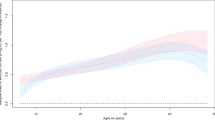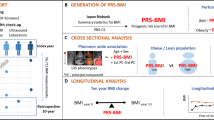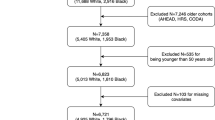Abstract
OBJECTIVE:
To investigate possible age-related changes in associations between polymorphisms in the fat mass and obesity-associated (FTO) gene and higher body mass index (BMI).
DESIGN AND SUBJECTS:
Multilevel mixed regression models were used to examine associations between four FTO variants and longitudinal BMI profiles in non-Hispanic white and African American children and adolescents 8–17 years of age from two different longitudinal cohort studies, the Bogalusa Heart Study (BHS) and Project HeartBeat! (PHB). In the BHS, there were 1551 examinations of 478 African Americans and 3210 examinations of 1081 non-Hispanic whites; in PHB, there were 971 examinations of 131 African Americans and 4458 examinations of 505 non-Hispanic whites.
RESULTS:
In African Americans, no significant FTO associations with BMI were found. In non-Hispanic whites, linkage disequilibrium among all four variants made haplotype analysis superfluous, so we focused on the single-nucleotide polymorphism, rs9939609. In longitudinal multilevel models, the A/A genotype of rs9939609 was associated with higher BMI in non-Hispanic whites in both cohorts at all ages. A significant age-by-genotype interaction found only in the BHS cohort predicted that in those with the A/A genotype, BMI would be ∼0.7 kg m−2 higher at age 8 and ∼1.6 kg m−2 higher at age 17 than in those with A/T or T/T genotypes. The design of PHB limited follow-up of any single individual to 4 years, and may have reduced the ability to detect any age-by-genotype interaction in this cohort.
CONCLUSIONS:
The A/A genotype of rs9939609 in the FTO gene is associated with higher longitudinal BMI profiles in non-Hispanic whites from two different cohorts. The association may change with age, with the A/A genotype being associated with a larger BMI difference in late adolescence than in childhood, though this was observed only in the BHS cohort and requires verification.
This is a preview of subscription content, access via your institution
Access options
Subscribe to this journal
Receive 12 print issues and online access
$259.00 per year
only $21.58 per issue
Buy this article
- Purchase on Springer Link
- Instant access to full article PDF
Prices may be subject to local taxes which are calculated during checkout


Similar content being viewed by others
References
Frayling TM, Timpson NJ, Weedon MN, Zeggini E, Freathy RM, Lindgren CM et al. A common variant in the FTO gene is associated with body mass index and predisposes to childhood and adult obesity. Science 2007; 316: 889–894.
Dina C, Meyre D, Gallina S, Durand E, Körner A, Jacobson P et al. Variation in FTO contributes to childhood obesity and severe adult obesity. Nat Genet 2007; 39: 724–726.
Cecil JE, Tavendale R, Watt P, Hetherington MM, Palmer CNA . An obesity-associated FTO gene variant and increased energy intake in children. N Engl J Med 2008; 359: 2558–2566.
Timpson NJ, Emmett PM, Frayling TM, Rogers I, Hattersley AT, McCarthy MI et al. The fat mass- and obesity-associated locus and dietary intake in children. Am J Clin Nutr 2008; 88: 971–978.
Zhao J, Bradfield JP, Li M, Wang K, Zhang H, Kim CE et al. The role of obesity-associated loci identified in genome-wide association studies in the determination of pediatric BMI. Obesity (Silver Spring) 2009; 17: 2254–2257.
Cha SW, Choi SM, Kim KS, Park BL, Kim JR, Kim JY et al. Replication of the genetic effects of FTO polymorphisms on BMI in a Korean population. Obesity (Silver Spring) 2008; 16: 2187–2189.
Chang Y-C, Liu P-H, Lee W-J, Chang T-J, Jiang Y-D, Li H-Y et al. Common variation in the fat mass and obesity-associated (FTO) gene confers risk of obesity and modulates BMI in the Chinese population. Diabetes 2008; 57: 2245–2252.
Hotta K, Nakata Y, Matsuo T, Kamohara S, Kotani K, Komatsu R et al. Variations in the FTO gene are associated with severe obesity in the Japanese. J Hum Genet 2008; 53: 546–553.
Marvelle AF, Lange LA, Qin L, Adair LS, Mohlke KL . Association of FTO with obesity-related traits in the Cebu Longitudinal Health and Nutrition Survey (CLHNS) cohort. Diabetes 2008; 57: 1987–1991.
Ng MCY, Park KS, Oh B, Tam CHT, Cho YM, Shin HD et al. Implication of genetic variants near TCF7L2, SLC30A8, HHEX, CDKAL1, CDKN2A/B, IGF2BP2, and FTO in type 2 diabetes and obesity in 6719 Asians. Diabetes 2008; 57: 2226–2233.
Tan JT, Dorajoo R, Seielstad M, Sim XL, Ong RT, Chia KS et al. FTO variants are associated with obesity in the Chinese and Malay populations in Singapore. Diabetes 2008; 57: 2851–2857.
Ohashi J, Naka I, Kimura R, Natsuhara K, Yamauchi T, Furusawa T et al. FTO polymorphisms in oceanic populations. J Hum Genet 2007; 52: 1031–1035.
Horikawa Y, Miyake K, Yasuda K, Enya M, Hirota Y, Yamagata K et al. Replication of genome-wide association studies of type 2 diabetes susceptibility in Japan. J Clin Endocrinol Metab 2008; 93: 3136–3141.
Li H, Wu Y, Loos RJF, Hu FB, Liu Y, Wang J et al. Variants in the Fat Mass- and Obesity-associated (FTO) gene are not associated with obesity in a Chinese Han population. Diabetes 2008; 57: 264–268.
Grant SFA, Li M, Bradfield JP, Kim CE, Annaiah K, Santa E et al. Association analysis of the FTO gene with obesity in children of Caucasian and African ancestry reveals a common tagging SNP. PLoS ONE 2008; 3: e1746.
Hennig BJ, Fulford AJ, Sirugo G, Rayco-Solon P, Hattersley AT, Frayling TM et al. FTO gene variation and measures of body mass in an African population. BMC Med Genet 2009; 10: 21.
Scuteri A, Sanna S, Chen W-M, Uda M, Albai G, Strait J et al. Genome-wide association scan shows genetic variants in the FTO gene are associated with obesity-related traits. PLoS Genet 2007; 3: e115.
Adeyemo A, Chen G, Zhou J, Shriner D, Doumatey A, Huang H et al. FTO genetic variation and association with obesity in West Africans and African Americans. Diabetes 2010; 59: 1549–1554.
Hakanen M, Raitakari OT, Lehtimäki T, Peltonen N, Pahkala K, Sillanmäki L et al. FTO genotype is associated with body mass index after the age of seven years but not with energy intake or leisure-time physical activity. J Clin Endocrinol Metab 2009; 94: 1281–1287.
López-Bermejo A, Petry CJ, Diaz M, Sebastiani G, de Zegher F, Dunger DB et al. The association between the FTO gene and fat mass in humans develops by the postnatal age of two weeks. J Clin Endocrinol Metab 2008; 93: 1501–1505.
Wardle J, Llewellyn C, Sanderson S, Plomin R . The FTO gene and measured food intake in children. Int J Obes 2009; 33: 42–45.
Haworth CMA, Carnell S, Meaburn EL, Davis OSP, Plomin R, Wardle J . Increasing heritability of BMI and stronger associations with the FTO gene over childhood. Obesity (Silver Spring) 2008; 16: 2663–2668.
Jacobsson JA, Danielsson P, Svensson V, Klovins J, Gyllenstein U, Marcus C et al. Major gender differences in association of FTO gene variant among severely obese children with obesity and obesity related phenotypes. Biochem Biophys Res Comm 2008; 368: 476–482.
Berenson GS, McMahan CA, Voors AW, Webber LS, Srinivasan SR, Frank GC et al. Cardiovascular Risk Factors in Children. The Early Natural History of Atherosclerosis and Essential Hypertension. Oxford University Press: New York, 1980.
Labarthe DR, Nichaman MZ, Harrist RB, Grunbaum JA, Dai S, for the Project HeartBeat! Investigators. Development of cardiovascular risk factors from ages 8 to 18 in Project HeartBeat! Study design and patterns of change in plasma total cholesterol concentration. Circulation 1997; 95: 2636–2642.
Hallman DM, Srinivasan SR, Elkasabany A, Boerwinkle E, Berenson GS . The Ser 447 -Stop polymorphism of lipoprotein lipase is associated with variation in longitudinal serum high-density lipoprotein-cholesterol profiles: The Bogalusa Heart Study. Metabolism 2001; 50: 894–904.
Hallman DM, Srinivasan SR, Chen W, Boerwinkle E, Berenson GS . The beta(2)-adrenergic receptor Arg16-Gly polymorphism and interactions involving beta(2)- and beta(3)-adrenergic receptor polymorphisms are associated with variations in longitudinal serum lipid profiles: The Bogalusa Heart Study. Metabolism 2004; 53: 1184–1191.
Cronk CE, Roche AF, Kent R, Berkey C, Reed RB, Valadian I et al. Longitudinal trends and continuity in weight/stature2 from 3 months to 18 years. Hum Biol 1982; 54: 729–749.
Hlaing WM, Prineas RJ, Zhu Y, Leaverton PE . Body mass index growth in a sample of US children: repeated measures data analysis of the Minneapolis Children's Blood Pressure Study. Am J Human Biol 2001; 13: 821–831.
Guo SS, Huang C, Maynard LM, Demerath E, Towne B, Chumlea WC et al. Body mass index during childhood, adolescence and young adulthood in relation to adult overweight and adiposity: the Fels Longitudinal Study. Int J Obes 2000; 24: 1628–1635.
Jess T, Zimermann E, Kring SII, Berentzen T, Holst C, Toubro S et al. Impact on weight dynamics and general growth of the common FTO rs9939609: a Longitudinal Danish Cohort Study. Int J Obes 2008; 32: 1388–1394.
Hardy R, Wills AK, Wong A, Elks CE, Wareham NJ, Loos RJF et al. Life course variations in the associations between FTO and MC4R gene variants and body size. Hum Mol Genet 2010; 19: 545–552.
Qi L, Kang K, Zhang C, van Dam RM, Kraft P, Hunter D et al. Fat mass- and obesity-associated (FTO) gene variant is associated with obesity. Longitudinal analyses in two cohort studies and functional test. Diabetes 2008; 57: 3145–3151.
Acknowledgements
This work was supported by the National Heart, Lung and Blood Institute grants HL070568 and HL089472 and the National Institute of Diabetes and Digestive and Kidney Diseases grant DK073618 (to DMH) and by the National Institute of Child Health and Human Development grants HD061437 and HD062783, the National Institute on Aging grant AG016592, and the American Heart Association grant 0855082E (to GSB). We wish to express our gratitude to the subjects and staff members of the PHB and the BHS.
Author information
Authors and Affiliations
Corresponding author
Ethics declarations
Competing interests
The authors declare no conflict of interest.
Additional information
Supplementary Information accompanies the paper on International Journal of Obesity website
Rights and permissions
About this article
Cite this article
Hallman, D., Friedel, V., Eissa, M. et al. The association of variants in the FTO gene with longitudinal body mass index profiles in non-Hispanic white children and adolescents. Int J Obes 36, 61–68 (2012). https://doi.org/10.1038/ijo.2011.190
Received:
Revised:
Accepted:
Published:
Issue Date:
DOI: https://doi.org/10.1038/ijo.2011.190
Keywords
This article is cited by
-
Processing body (P-body) and its mediators in cancer
Molecular and Cellular Biochemistry (2022)
-
The Impact of Variants in Four Genes: MC4R, FTO, PPARG and PPARGC1A in Overweight and Obesity in a Large Sample of the Brazilian Population
Biochemical Genetics (2021)
-
BMI loci and longitudinal BMI from adolescence to young adulthood in an ethnically diverse cohort
International Journal of Obesity (2017)
-
Current review of genetics of human obesity: from molecular mechanisms to an evolutionary perspective
Molecular Genetics and Genomics (2015)
-
The bigger picture of FTO—the first GWAS-identified obesity gene
Nature Reviews Endocrinology (2014)



